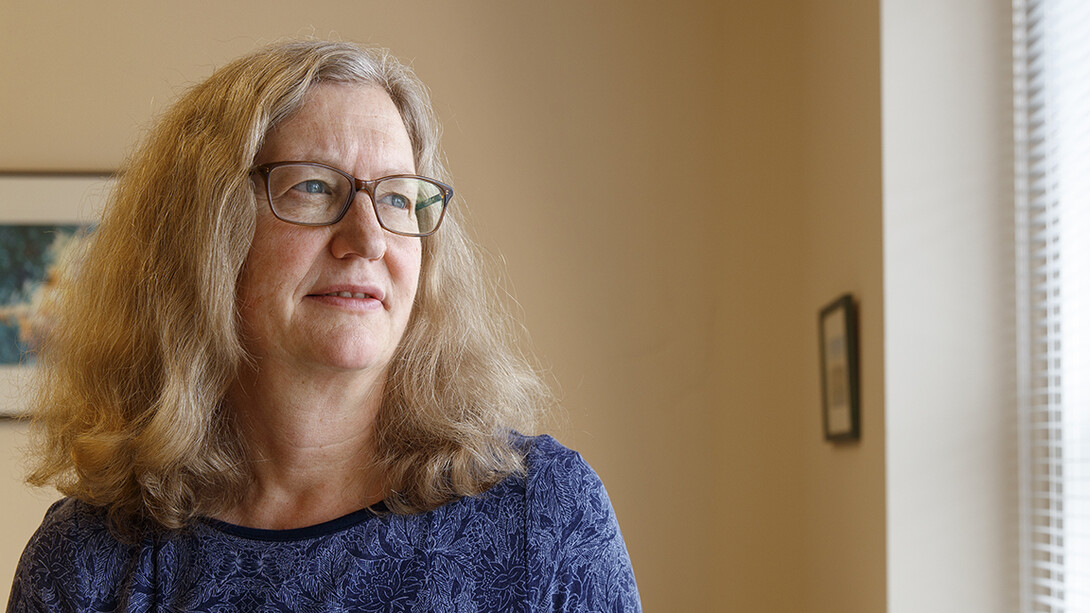
For the second time in a year, Margaret D. Jacobs has broken new ground for faculty at the University of Nebraska–Lincoln.
After being named Nebraska’s inaugural Carnegie Fellow in April 2018, the Chancellor’s Professor of History has earned membership in the American Academy of Arts and Sciences. Jacobs’ selection is a first for female faculty at Nebraska and marks the second time a Husker professor has earned the honor. She is among more than 200 new members announced by the academy on April 17.
“It is incredibly humbling to be included in the American Academy of Arts and Sciences,” Jacobs said. “So many of the academy members — present and past — are people who I look up to and have admired during my career. To be in their company is a surprise and a real honor.”
Founded in 1780 by John Adams, John Hancock and others, the American Academy of Arts and Sciences is one of the country’s oldest learned societies and independent policy research centers, convening leaders from academic, business and government sectors to respond to the challenges facing the nation and the world. It has more than 5,000 elected members who are global leaders.
Academy research focuses on higher education, the humanities and the arts; science and technology policy; global security and energy; and American institutions and the public good.
“While the work of this class includes areas never imagined in 1780 — such as cultural studies, cybersecurity, disease ecology, nanotechnology, paleoclimatology and superconductivity — the members of the class of 2019 embody the founders’ vision of cultivating knowledge that advances, in their words, a ‘free, virtuous and independent people,” said Nancy C. Andrews, chair of the academy’s board of directors.
A faculty member at Nebraska since 2004, Jacobs studies the history of the American West with a focus on women and gender, as well as children and family.
Jacobs started Native American research as a graduate student at the University of California, Davis, where an American Indian colleague, Annette Reed (Tolowa), often shared stories and a different historical perspective from what Jacobs had heard as a history major at Stanford University.
“She often had things to say about something we were reading or discussing and I thought, ‘I have never heard any of this,’” Jacobs said. “I was already interested in women’s history and I became fascinated by Native American history, particularly the ways in which white women became involved in carrying out a lot of policies toward American Indian children and families.”
In the last 20 years, Jacobs has studied the removal of indigenous children from their families during the settlement of America’s West. Many of her books and articles center on government policies from 1890 to 1940 that demanded that indigenous children be separated from their families and sent to distant boarding schools and other institutions.
Her studies have expanded to compare the American West experience with similar historical periods in Canada, Australia, New Zealand and South Africa.
In her most recent work through the Carnegie Fellowship, Jacobs is researching how nations — particularly the United States — can confront and take responsibility for human rights abuses against indigenous peoples.
The project, “Does the United States Need a Truth and Reconciliation Commission,” started as a book, but has grown to include an upcoming podcast and documentary. She is working on the project with Kevin Abourezk, a journalist and freelance writer.
Jacobs is also co-director of the Genoa Indian School Digital Reconciliation Project and has been director of the women’s and gender studies program at the University of Nebraska–Lincoln. From 2015-16, she served as the Pitt Professor of American History and Institutions at Cambridge University.
Jacobs has published 35 articles and three books. Her book “White Mother to a Dark Race: Settler Colonialism, Maternalism and the Removal of Indigenous Children in the American West and Australia, 1880-1940” won the 2010 Bancroft Prize from Columbia University.
The University of Nebraska–Lincoln is among 64 institutions that accepted an invitation in 2015 to become a university affiliate of the American Academy of Arts and Sciences. The partnership allows Nebraska to participate on academy studies on higher education and help support its fellowships and outreach programs.
Jacobs is the second Nebraska faculty member to be named an academy member, joining Joseph Michael Daly. A University of Minnesota graduate, Daly served as a professor of plant pathology, biochemistry and nutrition at Nebraska from 1955 until retirement around 1990. He was inducted into the academy in 1986.
Other former Husker faculty — including Joseph Francisco and James Moeser — are members of the academy, but earned the honor outside their tenures at Nebraska.
Jacobs will be inducted into the American Academy of Arts and Sciences during an Oct. 12 ceremony in Cambridge, Massachusetts. Other members of the class of 2019 include former First Lady Michelle Obama; gender theorist Judith Butler; The Atlantic journalist James M. Fallows; and Cisco Systems leader Charles H. Robbins.







